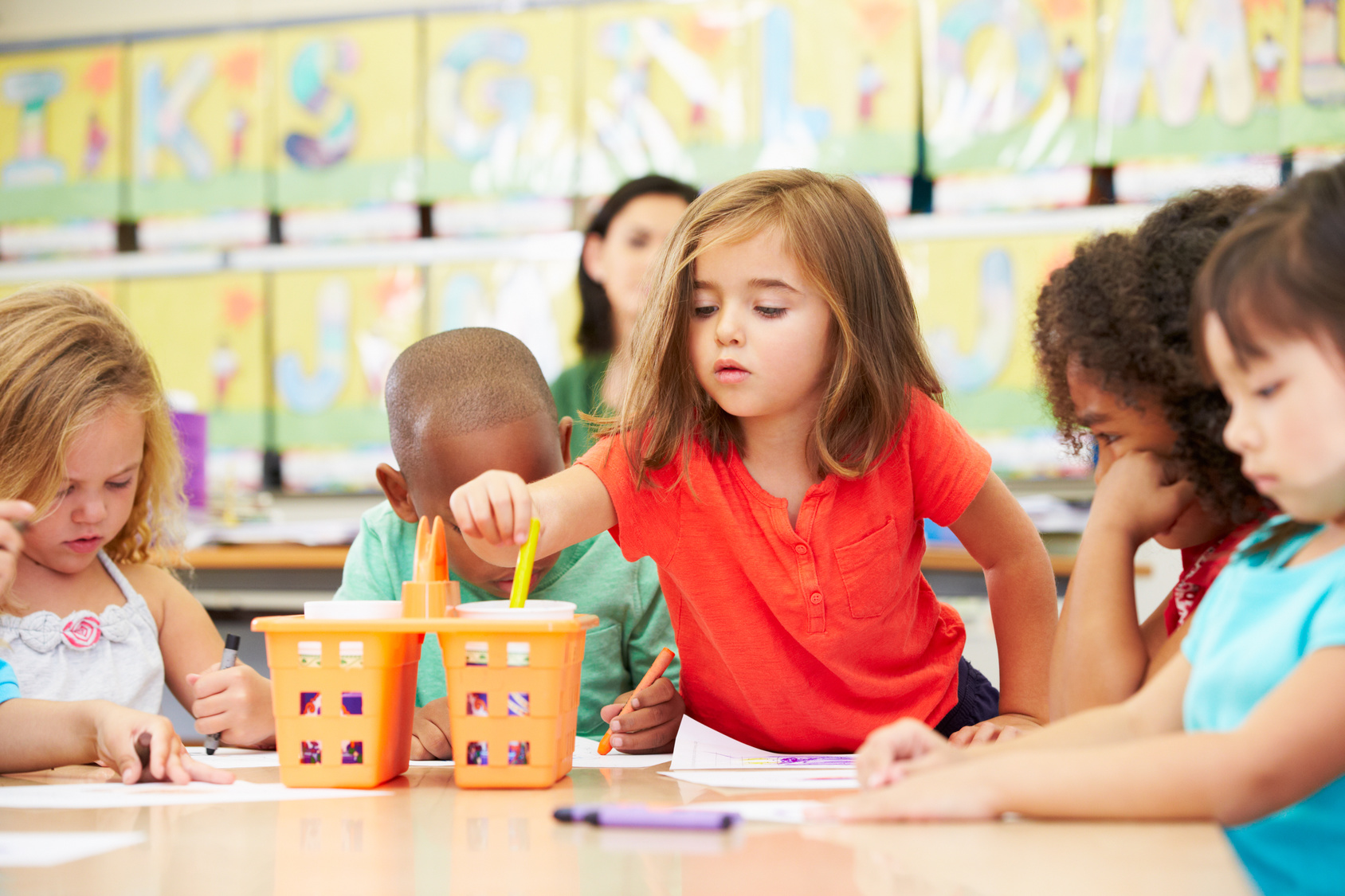
Curriculum
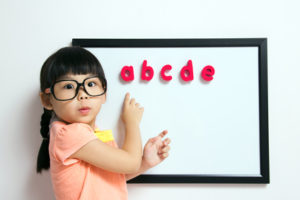 At The Apple Tree Center we use a MSDE recommended state approved curricula for all ages. The Creative Curriculum is a learning concept that allows for children to develop through hands on stimulating and engaging activities. Learning opportunities are developmentally appropriate, multi sensory, enriching and based on the needs and interest of the whole child. We focus on the domains of learning for all children which according to the Maryland’s Guide to Early Childhood Pedagogy Guide includes social foundations, Physical Well – Being and Motor Development, Language and Literacy, Mathematics, Science, Social Studies, and the Arts. Activities provide learning opportunities through whole group, small group, and individual learning. Additional materials and resources are used to enhance the learning experience and to prepare the individual child for the next step in their development.
At The Apple Tree Center we use a MSDE recommended state approved curricula for all ages. The Creative Curriculum is a learning concept that allows for children to develop through hands on stimulating and engaging activities. Learning opportunities are developmentally appropriate, multi sensory, enriching and based on the needs and interest of the whole child. We focus on the domains of learning for all children which according to the Maryland’s Guide to Early Childhood Pedagogy Guide includes social foundations, Physical Well – Being and Motor Development, Language and Literacy, Mathematics, Science, Social Studies, and the Arts. Activities provide learning opportunities through whole group, small group, and individual learning. Additional materials and resources are used to enhance the learning experience and to prepare the individual child for the next step in their development.
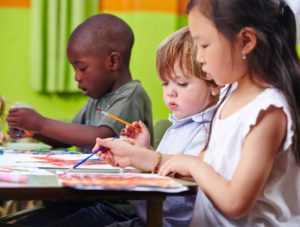
In the preschool classrooms teachers will access the progress of each child weekly and provide opportunities for differentiated instruction through small group instruction. Teachers are provided tools to assist with the implementation of the lessons to promote each child’s learning style. Additional materials and resources include but are not limited to STEM, Open Court, Common Core, and Ready at Five, to assist with age-appropriate development. Lesson plans address the developmental needs of the whole child through assessments, observations, and information gathered from families, some of which may include IFSP/IEP.
Infant A and B
Our curriculum is designed to develop and reinforce each infant’s individuality. Children participate in sensory-based learning experiences, while receiving positive, nurturing guidance. We know infants are constantly learning through observation. Within our infant daycare program, we provide fun activities that will help them build upon their cognitive, communication, emotional, fine motor, gross motor and social skills.

Activities in the infant classroom include:
Playing peek-a-boo, completing simple wooden puzzles, singing, exploring clay objects with their hands, practicing rolling over and tummy time and listening to music.
Areas of Development:
The infant curriculum focuses on your infant’s primary areas of development.
- Emotional Skills
- Social Skills
- Communication Skills
- Fine Motor Skills
- Gross Motor Skills
- Cognitive Skills
Toddlers 1 and 2
Our curriculum is designed to develop and reinforce each toddler’s individual needs. Children participate in sensory-based learning experiences, while receiving positive, nurturing guidance. The curriculum will help your child develop their cognitive, communication, emotional, fine motor, and gross motor and social skills.
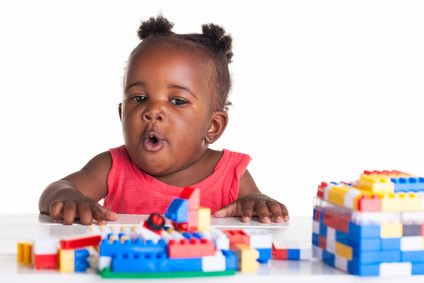
Activities in the toddler classrooms include:
Singing songs, finger plays, improving their vocabulary through identification and repetition, learn to wash their hands and feed themselves, enjoy age-appropriate playgrounds and practice sharing with other students. Our teachers encourage the child to work at their own speed so they feel successful in the skills they are developing.
Areas of Development:
The curriculum focuses on your toddler’s primary areas of development.
- Emotional Skills
- Social Skills
- Communication Skills
- Fine Motor Skills
- Gross Motor Skills
- Cognitive Skills
Two’s
We encourage your child to examine, create, and share as he broadens his language through interactions with his teachers and classmates in a safe, nurturing environment. Sensory and repetitive activities transform these new experiences into knowledge. Two year olds want to be independent. They want to explore, touch and mimic their peers and teachers. Their daycare curriculum focuses on language arts and literacy, mathematics, science, social and emotional development, gross and fine motor development. Through learning centers and age-appropriate activities, our two year olds have the ability to work at their own pace and learn to do tasks independently.
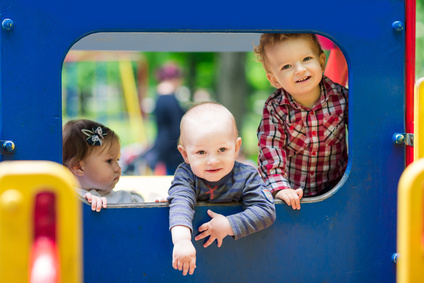
Activities in the two year old classrooms include:
Practicing writing skills while painting, drawing, and coloring, completing patterns, charting the daily weather and learning about recycling, participating in circle time, gross motor play, and learning about honesty and sharing.
Areas of Development:
The curriculum focuses on your two-year-old child’s primary areas of development.
Three’s
Our three-year-olds program focuses on your child’s primary areas of development: language arts and literacy, mathematics, science, social and emotional development, gross and fine motor development.
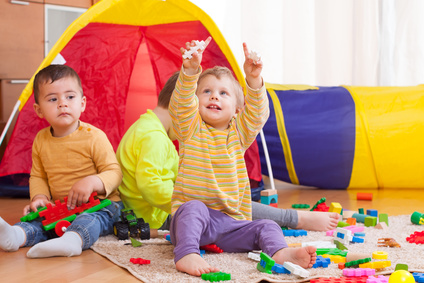
Activities in the three year old classrooms include:
Recognizing print through learning center signs; dramatic play; practice counting beads or blocks; learning about people, plants and animals; participating in activities with their peers; practicing balance, jumping and throwing; participate in family style dining and learn about patience.
Areas of Development:
The curriculum focuses on your three-year-old child’s primary areas of development.
- Communication and Language Development
- Social and Emotional Development
- Physical Development
- Cognitive Development
- Math Skills Development
- Science Skills Development
Four’s Pre-K
The preschool curriculum is a planned program of thematic units. Each theme is built upon a series of hands-on activities, which are integrated throughout all subject areas and learning centers. Children will learn math, science, vocabulary, reading and social skills. Four year olds are eager to learn new things, we allow them to do so through teacher and peer interaction in both large and small groups. The curriculum focuses on developing your child’s skills in several areas, including: language arts and literacy, mathematics, science, social and emotional development, gross and fine motor development.
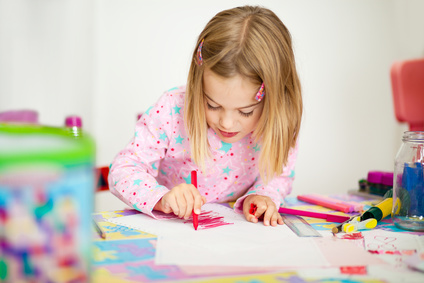
Activities in the 4 year old classrooms include:
Reciting poems and sharing stories, calculating ad measuring things, identifying differences in the world around them, beginning to identify their feelings, and learn about sharing and generosity.
Areas of Development:
The preschool day care curriculum focuses on your 4-year-old child’s primary areas of development.
- Communication and Language Development
- Social and Emotional Development
- Physical Development
- Cognitive Development
- Math Skills Development
- Science Skills Development
